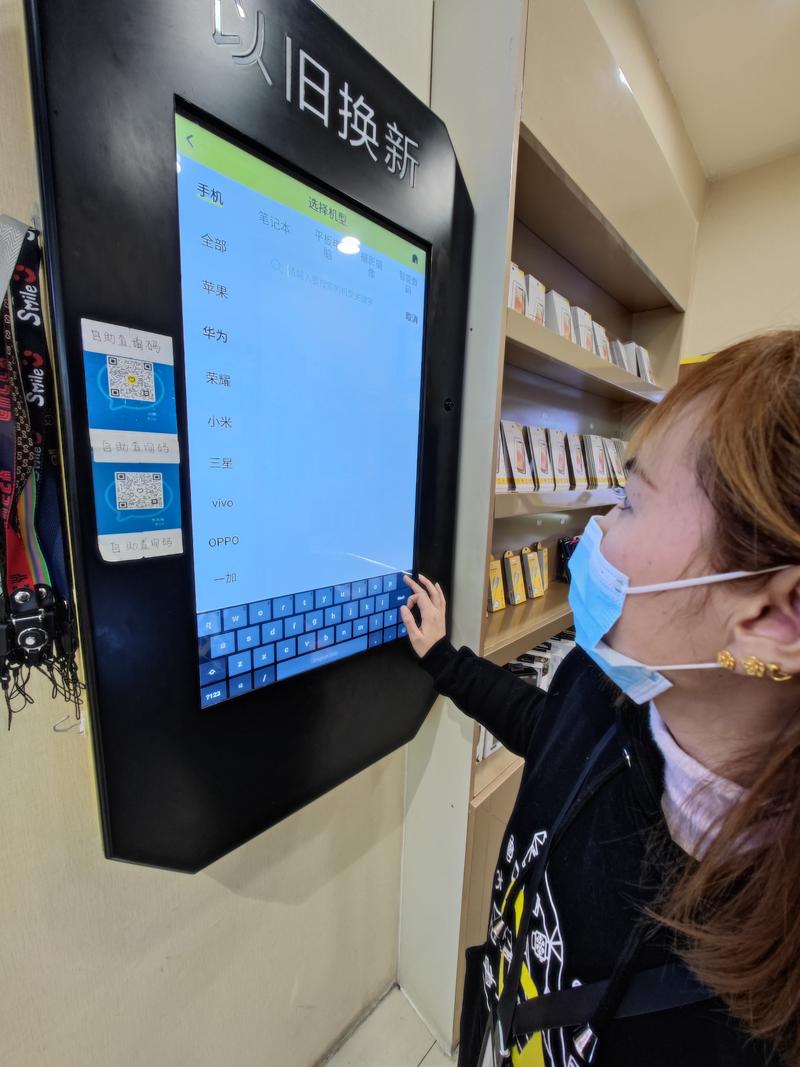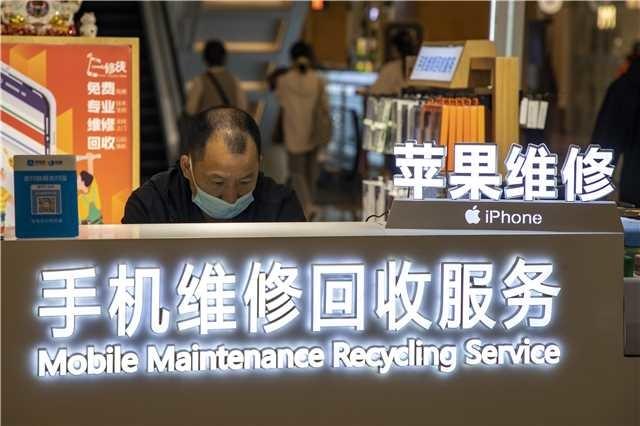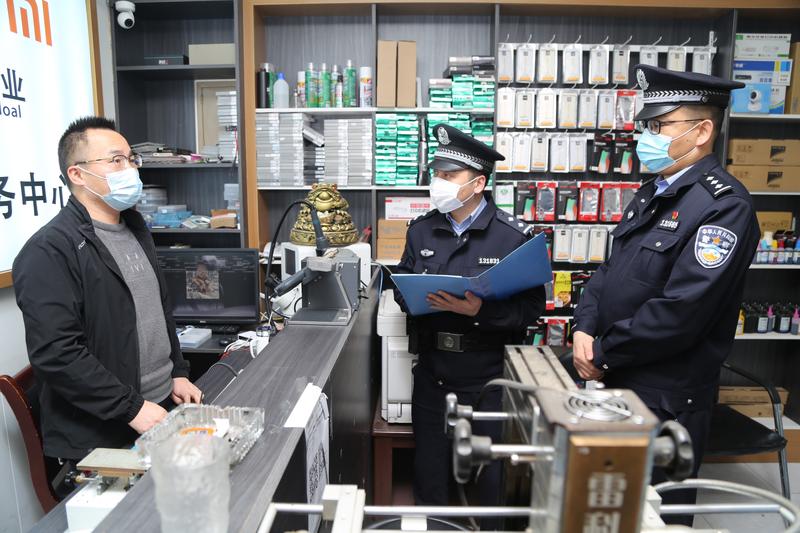Devices contain toxic substances, posing health threat if not disposed of properly
 Customers are served at a phone recycling shop in Shanghai. (YI BAI / FOR CHINA DAILY)
Customers are served at a phone recycling shop in Shanghai. (YI BAI / FOR CHINA DAILY)
Shao Heng, who works for a cellphone recycling company in Beijing, feels he is in a privileged position.
"I can always keep abreast of the latest mobile devices through my job," he said.
After seeing how they deleted the information in my device, and how they assessed the phone’s value, I no longer had any such concerns.
Si Jia, Beijing resident
Numerous electronics enthusiasts join long lines to buy the latest handsets, but some of them visit Shao's store to sell their devices soon afterward, said the 28-year-old, who works for the secondhand platform Aihuishou, which is headquartered in Shanghai.
People buy new phones to see how good they are, but then sell them simply because they feel the handsets are too heavy, or they don't like the color, Shao said.
Such a scenario shows the frequency with which Chinese are changing their smartphones. According to a recent survey by the Society of Entrepreneurs and Ecology, an NGO based in Beijing, which interviewed 3,348 respondents, 43.4 percent of Chinese change their phones just one to two years after buying them.
In 2020, some 460 million cellphones were lying idle in China, resulting in huge wastage, as many of them could still be used. The components in the handsets were in good condition and were available for recycling for raw materials such as plastic and precious metals.
According to experts, concern over personal information being leaked is a major factor for people's reluctance to sell their old phones.
The experts called for accelerated efforts by the government to address these concerns, and they also want to see manufacturers introduce green designs to help with personal information protection and to extend the service life of devices.
Recycling phones that are no longer used is an important way to help reduce carbon dioxide emissions, the experts added.
 A customer checks prices of second hand phones in Harbin, Heilongjiang province. (WANG YUNLONG / FOR CHINA DAILY)
A customer checks prices of second hand phones in Harbin, Heilongjiang province. (WANG YUNLONG / FOR CHINA DAILY)
Poor performances
The survey by the Society of Entrepreneurs and Ecology found that due to upgrades, the service life of mobile devices fell from five to three years in 2015, and to 2.2 years in 2018.
People change their phones mainly due to battery decay and high repair costs, the survey found. Consumers in metropolises tend to change their devices more frequently than those living in smaller cities.
Zhu Liyang, president of the China Association of Circular Economy, said research by his team shows that 6 billion mobile phones will no longer be in use in China by the end of 2025.
These devices, which contain toxic and harmful substances, including lead and mercury, will pollute soil and groundwater if they are abandoned, posing a health risk, Zhou said at a recent news conference in Beijing, adding that there is an upside to the situation.
Some 4,000 metric tons of plastic, 3,000 tons of steel, 1,000 tons of copper, 30 tons of silver and 1.5 tons of gold, along with other precious metals such as tungsten, cobalt and palladium, can be produced from recycling every 100 million devices that are no longer in use.
Zhu stressed that it is more climate- and eco-friendly if these phones are reused as second hand products. If a consumer chooses to use a second hand phone instead of buying a new one, this will help reduce carbon dioxide emissions, he said.
However, Zhu added, "Most of these devices are not effectively used or properly disposed of."
 A recycling shop in Shanghai handles disused cellphones. (PHOTO PROVIDED TO CHINA DAILY)
A recycling shop in Shanghai handles disused cellphones. (PHOTO PROVIDED TO CHINA DAILY)
Lying idle
Research by the China Association of Circular Economy shows that 54.2 percent of mobiles are left idle in people's homes. Zhu confirmed that a major reason for this is fears over personal information leaks.
Zhu's view is supported by Yang Ziyi, senior program officer at the Society of Entrepreneurs and Ecology, who took part in the association's survey.
"Asked why they don't sell mobiles they no longer use, many people said they had no idea about where their devices would end up, or whether they would cause pollution when disposed of," Yang said. "Some said they were afraid that their information would be sold after being extracted from the devices."
A Beijing resident, who gave her name only as Chu, and who relies heavily on smartphones, said, "I have a small pile of disused phones at home."
She said she dared not sell them, as she forgot to make backup copies of the information in the devices and fears that her personal details will be leaked.
Si Jia, 23, who also lives in Beijing, said he initially doubted that if he sold his phones, their value would be fairly assessed, or that he would receive a reasonable price for them.
However, he finally decided to sell his iPhone 12 Pro Max for 4,700 yuan ($680) after visiting an Aihuishou store.
"After seeing how they deleted the information in my device, and how they assessed the phone's value, I no longer had any such concerns," he said.
Wu Yufeng, dean of the School of Circular Economy at Beijing University of Technology, said that in recent years breakthroughs have been made in the technologies used for irreparable information removal.
The main problem behind people's reluctance to sell phones they no longer use is that they sometimes don't trust those who will remove their information.
Wu said that to end these concerns, the government should draw up technological standards and introduce official authentication for the irreparable removal of information.
Stressing that people have an emotional attachment to their phones, Wu also called for manufacturers to improve their designs.
"The mobile phone is not only a device, it contains records of people's work, along with photos and videos about their lives," he said.
Wu added that one way to address mistrust and leave photos and videos intact is to make it easy for people to dismantle the storage hardware in their phones and read it via computer.
 Police officers inspect a second hand phone shop in Pingliang, Gansu province. (ZHENG BING / FOR CHINA DAILY)
Police officers inspect a second hand phone shop in Pingliang, Gansu province. (ZHENG BING / FOR CHINA DAILY)
Jia Feng, former head of the Center for Environmental Education and Communication at the Ministry of Ecology and Environment, said the green design of mobile phones is also a concern.
Wearing trousers he bought in 1990 and holding a bottle he has used for two decades, Jia said it was a "great pity" for him to abandon a Nokia phone several years ago. A keen environmentalist, he has commuted by bicycle for years. He had no choice but to stop using the phone, because the app for shared bikes could not be installed on the device.
"Not all consumers need fast-speed mobile phones with a large storage capacity," Jia said.
If manufacturers can upgrade phone designs and enable new apps to be installed on old devices, this will greatly prolong the life of some handsets, he added.
It might not be difficult to put Jia's idea into practice, but it could be hard for environmentalists such as him to reverse the rapid rise in the number of phones no longer in use.
Cheng Huiqiang, an official at the National Development and Reform Commission's Department of Resource Conservation and Environmental Protection, said disused phones have become a type of electronic waste, and the stockpile is rapidly mounting in China and around the world.
"This type of electronic waste is the most difficult to dispose of," he added.
"Achieving highly efficient recycling, utilization and disposal of this large number of mobile devices is an urgent issue," Cheng added.
Shao, the Aihuishou employee, said customers sometimes bring more than 20 disused phones to his store after they find to their surprise that there is an outlet dedicated to receiving these devices, adding that they not only bring their own phones, but those of relatives.
"Some customers show a strong awareness of environmental protection. When they learn that our company can dispose of phones that are no longer needed, they say they will give all their idle devices to us for free," Shao said.


